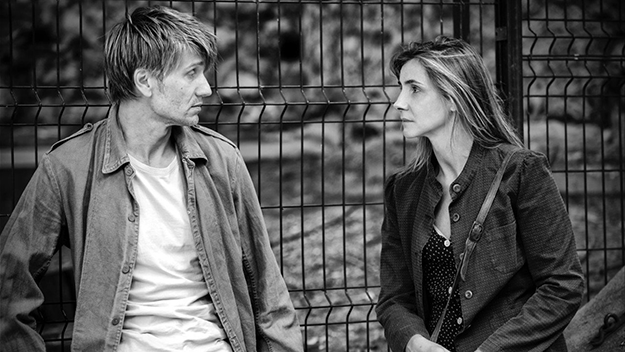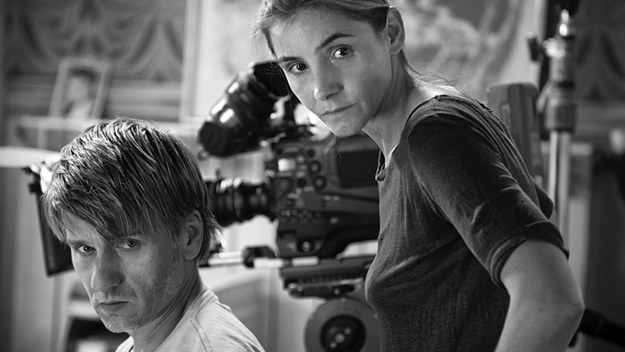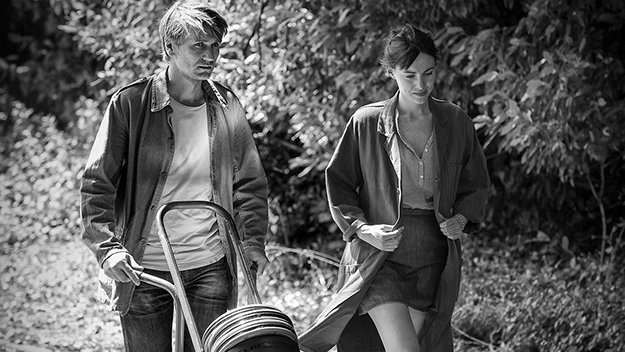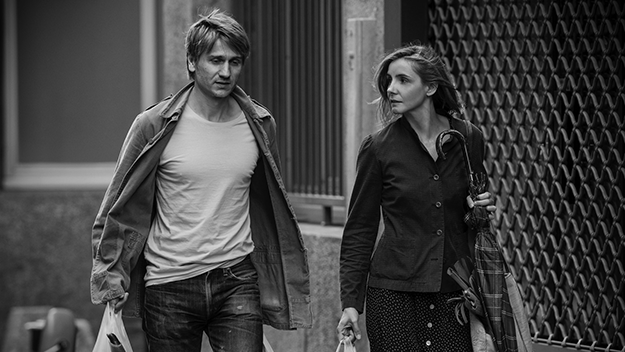Film of the Week: In the Shadow of Women

I wouldn’t say that I altogether have a blind spot with Philippe Garrel, but he’s one of the major French filmmakers that I have the most trouble mustering enthusiasm about, at least consistently. I’m not the only one—Jonathan Rosenbaum has written about his own problems warming to Garrel’s work, given that so many of his colleagues are passionate supporters of this director. I certainly admire a number of Garrel’s recent films, although I only caught up with his work with 1999’s Night Wind. That film’s haunting sobriety was very much to my taste, and I liked Regular Lovers (05) even more—not least because its very personal reminiscence of May ’68 so acutely captured both the intensity of such a moment and the awareness of how quickly such moments pass, in danger of being forgotten almost as soon as they’re lived.
Conversely, two of his later films felt to me like indigestible duds: Frontier of the Dawn (08), its tale of doomed amour fou reaching its nadir with a hallucinatory/supernatural apparition in a mirror; and A Burning Hot Summer (11), a torpid Rome-set melodrama. My distrust of this director comes partly from his casting of son Louis Garrel in roles that indulge Junior’s mode of narcissistic indolence (Summer’s shot of Louis looking suicidally bored as Monica Bellucci clips his toenails thoroughly deserved the guffaws that greeted it at the Rome Film Festival). The director may not be innocent of narcissism himself: there’s a line in, if I remember this right, Jealousy (13), in which a woman admiringly comments to the Louis character that he takes after his father, a brilliant man—presumably tongue in cheek, but even so…
The recent Garrel films that have overcome my resistance have done so partly because of the strong presences of the women that he casts—two particular cases being the angular, electric Clotilde Hesme in Regular Lovers, and the always enigmatic Anna Mouglalis in Jealousy. In the Shadow of Women comes up trumps again, notably because of Clotilde Courau. In the past, she has exuded a sort of perky freshness that was perfectly pitched for mainstream French cinema, but that I wouldn’t have imagined fitting into the downbeat Garrel universe. In Shadow, however, Courau looks as if she’s lived a bit, and while her fresh vivacity shows in certain scenes, we also believe she’s a woman who’s acquired wisdom and known disappointment. She brings the film to life. Conversely, if Louis G got your goat in recent films, be warned—when it comes to lugubrious ennui, he can’t begin to compare with this film’s male lead Stanislas Merhar.

With Garrel’s three credited co-writers including no less than Jean-Claude Carrière (the others are Arlette Langmann and Caroline Deruas), In the Shadow of Women is a concise (73-minute), economically executed story about a love triangle. It’s the sort of tautly observed narrative, mapping fine emotional or moral complexities, that in French literary fiction is sometimes classified as a récit—key exponents being André Gide and Marguerite Yourcenar, notably in her sublime Coup de Grâce. The film begins with two extended shots of Merhar, making us think that his character Pierre will be the center of the film—but although he possibly gets the most screen time, the story is just as much focused on Courau’s character. She plays Manon, Pierre’s wife and collaborator: he’s a documentary director, she’s his editor and amanuensis, but their work doesn’t seem to be getting them anywhere. They’re involved in a long-term project, filming an old man (Jean Pommier), as he narrates his wartime experiences in the Resistance—while his wife (Thérèse Quentin) tries to get a bit of attention for herself by drawing attention to her homemade biscuits, herself as much cast into the background (the “shadow”) as Manon.
Pierre and Manon live in an apartment with peeling walls, eking out a meager subsistence, and are way behind with their rent—and even further behind, it seems, with their lives. They’re no spring chickens, a fact underlined by Merhar’s face: the cherubic if effete youth of Chantal Akerman’s La Captive (00) now has the haggard mien of someone who’s seen too many frosty mornings in Parisian attic rooms. When we meet Manon, she’s enduring humiliation from a landlord who complains that she and Pierre are not keeping the flat orderly, as the rules demand. The term he uses is occuper les lieux bourgeoisement—and it’s suggested that, like many Garrel characters, these two prefer not to occupy the premises, or indeed do anything, bourgeois-style. It’s an ethical as well as a lifestyle choice, but it doesn’t seem to be doing them much good.
Meanwhile, Manon—lovesick or deluded, or both—tells her mother that she’s happy to be at Pierre’s side: “Working with the man you love—what could be better?” To her mother’s objection that what Pierre does as a documentarist is no big deal, Manon replies: “He knows how to listen.” His silence, she says, makes people open up—but we may be as skeptical as Maman, now that we’ve watched Pierre in “action.” His interviewing technique consists of gazing blankly as his subject speaks, while his own features slowly sink a few more centimeters towards the ground.

Still, his inertia must have some charm, since Pierre soon embarks on an affair with younger woman Elisabeth (a nicely ambivalent, anxious performance from newcomer Lena Paugam). While she seems genuinely to fall for him, the intermittent and omniscient voiceover narration (read by Louis Garrel) makes it clear that Pierre only visits her for pleasure (the French specifies “for the pleasure of the flesh”) before dashing home again. Elisabeth later glimpses Manon in town—with a lover of her own. That prompts the most suggestive line in the film, as the voiceover reveals: “Inexplicably, she felt sullied in her love of Pierre.” This line suddenly opens up a whole field of (at least potentially) unfathomable complexity, and another female perspective in a narrative that otherwise might seem to be about the experience of an inconstant male.
The story doesn’t get much more complex in terms of event, although the emotional stakes are heightened, the ironies become more uncomfortably delicate, and Pierre seems increasingly the object of the film’s open condemnation as a liar to himself and to the two women. Oddly, the film explains a lot about Pierre’s feelings and thoughts, while barely bringing us close to him dramatically; conversely, it brings us emotionally much closer to the two women, who seem both knowable and human, while explicitly telling us little about them. They are allowed to be, while Pierre is treated dispassionately as a specimen for study.
The sense of detached scientific-moral observation is heightened by the way that the film appears to take place in a non-specific time, possibly at some point in the recent past, although everyone looks as if they’re living in 2015. Manon, Pierre, and Elisabeth all work with film, not video; Manon’s friend Lisa (the always lively Vimala Pons) tells a story about using a telephone box, just as a man walks past using a mobile phone. Altogether, the film seems to be set in a world that’s not quite real or specific: Garrel often shoots in nondescript Paris streets that never betray their exact location, while Pierre and Elisabeth first meet within the walls of the 19th-century Fort d’Ivry. When Pierre and Manon bump into a neighbor while out shopping, it’s a sudden incursion of a recognizable everyday now. It’s also a glimpse of that mundane domesticity that is so painful to Pierre; he even rages to Elisabeth, on one of his visits to her apartment: “I feel cooped up here . . . You’re sucking the life out of me.”

It’s the very subtly stylized economy with which the film frames its portrait of such an odious prick that makes the film bearable to watch—and ultimately makes it seem as if Merhar’s hangdog performance has a layer of ironic distance built into it, as if we’re not meant to take Pierre at face value as a bohemian agonist. Shot in beautifully stark black and white by Renato Berta, the film is elegantly executed, but often it’s a matter of understated grace notes: the way that Pierre, storming out of Elisabeth’s apartment, seems to disappear into a fold in the wall; the casually complex shot in which Elisabeth, briefly turning to look at Manon and her lover, is caught in a mirror outside a café; or a night shot in Pierre and Manon’s bedroom, where the chiaroscuro has the texture of a lino cut. The end credits, by the way, highlight not just Berta as DP but also Jean-Paul Meurisse as cadreur, the cameraman in charge of framing.
It’s this detachment and economy that make the film so effective even when its ironies seem obvious or over-stressed: wouldn’t you know that, for all Pierre’s much-vaunted silence and talent for listening, Manon turns out to have been the one finely tuned to detecting the truth. There is a sobering payoff in terms of the tragic futility of filmmakers’ attempt to capture reality—although, if you’ve seen Noah Baumbach’s While We’re Young, you may come out of Garrel’s film feeling that, unlike failed Parisian documentarists, their New York counterparts at least get to mix some fun with their agony.
Jonathan Romney is a contributing editor to FILM COMMENT and writes its Film of the Week column. He is a member of the London Film Critics Circle.



